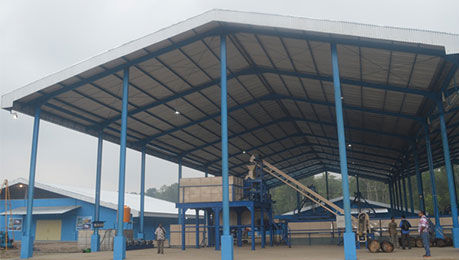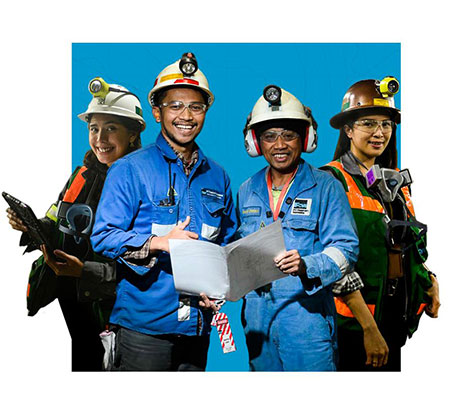02 November 2015

After a long wait, the Sago factory for the people located in Keakwa Village, Central Mimika District, finally officially started operation. The sago factory for the people was inaugurated by a blessing ceremony of the building and all facilities in the factory by the Timika Bishop Mgr John Philip Saklil Pr on Tuesday (10/27).
The start of operations of the sago factory for the people built by the Institute for Amungme and Kamoro Community Development (LPMAK) brought new hope for the Kamoro citizens, not just residents of Keakwa Village, but also residents of the other villages surrounding the area such as Timika Beach, Atuka, Kokonao, and several others.
They assembled in great numbers to the factory site located a few kilometers from the Keakwa village travelling by motorized boats and other traditional boats. The sago factory for the people was built on the former site of the old Keakwa village. The old village used to be a residential area for the Keakwa people during World War II. "This place is the old village of Keakwa people. During the war situation at that time, the residents left in groups to build hidden settlements in the woods. When it was secure and the church entered, the community relocated near the beach. People never dreamed this village will be restored. It's a miracle, from the impossible becomes possible," said Bishop John Saklil.
Indeed Bishop Saklil fully understands the life of the Kamoro tribe in coastal areas of Mimika regency because he was born and raised in the areas of the Kamoro tribe. His father was a pioneer teacher in the Mimika region ranging from the Far West of Mimika in Umar to Timika Beach. The new Keakwa village which is now home to hundreds of families, during World War II was the main Japanese defense base in the southern region of Papua. At this location there are still many World War II heritage such as a tank and two cannons. Unfortunately, these piles are silent witnesses to a gruesome history was just left there and untreated. The two Japanese cannons is now buried in the shoreline of Keakwa beach due to the high abrasion at that location.
New Hope
On this occasion, Bishop Saklil reminded the citizens of Kamoro to be grateful for the construction of this sago factory for the people by LPMAK, a nonprofit institution that manages the partnership funds of PT Freeport Indonesia. "This sago factory has brought a new light because humans need to live, need to eat and drink. It has become a new hope for everyone," he said.
He asked the Keakwa residents to be able utilize this facility, it was built costing billions of rupiah in order to improve their quality of lives."No one planted our sago trees. It was planted by God. If the sago trees are cut down, over time it will run out. Our duty is to plant the sago trees on plain lands to bequeath to our children and grandchildren," said Bishop Saklil reminding the local resident’s quality of life. "The same goes for sago, marine produce such as snails, Karaka (crabs), shrimp, and fishes are a blessing so that our children can go to school up to college level, our kitchen filled and people do not get sick and die because they cannot afford medical treatment. If all the natural resources that God has given freely cannot be maintained by us, we will remain poor over our natural resources," he said.
The Secretary of Keakwa village Wiro Potereyauw representing local communities conveyed his gratitude to LPMAK and PT Freeport Indonesia for building this sago factory in his village. "Hopefully, this facility can sustain the economy of the Keakwa village and Kamoro society in general," wishful Wiro. Wiro also informs that the Keakwa and Mimika coastal villages have only relied on fishing, shrimps, crabs and coconut to support their family and to educate their children.
With the sago factory for the people in Keakwa, he said, local residents will have an additional source of income. Keakwa residents are divided into three groups that will sell sago stems from their land or hamlet to the sago factory of the people. This, he said, is a breath of fresh air for the Keakwa citizens and villages around that area that have a broad stretch of sago trees and has not been optimally used to support the economy of the people. Hereditary, he said, the Kamoro people only use a small fraction of sago for their daily consumption.
Meanwhile the Executive Secretary of LPMAK, Emanuel Kemong ask local residents to fully support the operation of the sago factory for the people. "Through this facility, people can have an income. The public will enter the forest to cut the sago trees to handover to the factory for sale. Youths will be involved to manage this factory together," said Emanuel. He asserted that LPMAK is not playing around with the community’s business. "LPMAK not running a hidden business by building this facility. This facility was built solely to help the Kamoro people be better. These assets are for you. LPMAK is committed to the community, "said Emanuel.
By Evarianus Supar (Antara).
Kami menghimbau para pencari kerja untuk berhati-hati dan mewaspadai beragam modus penipuan perekrutan yang mengatasnamakan PT Freeport Indonesia. Dalam setiap proses rekrutmen dan penerimaan karyawan, PT Freeport Indonesia maupun konsultan rekruitmennya tidak memungut biaya apapun.
Untuk melihat lowongan, silakan akses melalui link berikut: ptfi e-recruitment
Untuk melihat informasi magang, silakan akses melalui link berikut: Internship Program
